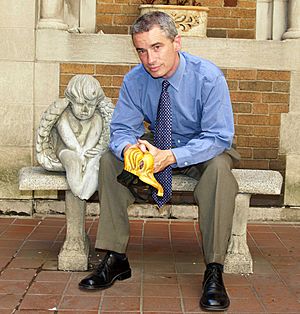Jim McGreevey facts for kids
Quick facts for kids
Jim McGreevey
|
|
|---|---|

McGreevey in 2009
|
|
| 52nd Governor of New Jersey | |
| In office January 15, 2002 – November 15, 2004 |
|
| Preceded by | Richard Codey (acting) |
| Succeeded by | Richard Codey |
| 19th Mayor of Woodbridge Township | |
| In office January 1, 1992 – January 15, 2002 |
|
| Preceded by | Joseph DeMarino |
| Succeeded by | Frank Pelzman |
| Member of the New Jersey Senate from the 19th district |
|
| In office January 11, 1994 – January 13, 1998 |
|
| Preceded by | Randy Corman |
| Succeeded by | Joe Vitale |
| Member of the New Jersey General Assembly from the 19th district |
|
| In office January 9, 1990 – January 14, 1992 Serving with George Otlowski
|
|
| Preceded by | Alan Karcher |
| Succeeded by | Stephen A. Mikulak Ernest L. Oros |
| Personal details | |
| Born |
James Edward McGreevey
August 6, 1957 Jersey City, New Jersey, U.S. |
| Political party | Democratic |
| Spouses |
Kari Schutz
(m. 1991; div. 1997)Dina Matos
(m. 2000; div. 2008) |
| Children | 2 |
| Education | Catholic University Columbia University (BA) Georgetown University (JD) Harvard University (MEd) General Theological Seminary (MDiv) |
James Edward McGreevey (born August 6, 1957) is an American politician from the Democratic Party. He served as the 52nd governor of New Jersey from 2002 until he resigned in 2004. His resignation happened after a public announcement about his personal life.
Before becoming governor, McGreevey held several other political jobs. He was a member of the New Jersey General Assembly and the New Jersey Senate. He also served as the mayor of Woodbridge Township, New Jersey. He ran for governor in 1997 but lost. He ran again in 2001 and won by a large number of votes.
During his time as governor, McGreevey faced a major personal challenge. On August 12, 2004, he announced that he was gay and had a relationship with a man he had hired for his staff. At the time, McGreevey was married to a woman. Because of the controversy this caused, he announced he would resign as governor.
After leaving politics, McGreevey wrote a book about his life. He also studied to become a priest in the Episcopal Church. Later, he began working to help people who have been released from prison. He is currently running for mayor of Jersey City, New Jersey in the 2025 election.
Contents
Early Life and Schooling
James "Jim" McGreevey was born in Jersey City, New Jersey. His father, Jack, was a Marine, and his mother, Veronica, was a nurse. He grew up in an Irish Catholic family in the nearby town of Carteret.
McGreevey was a dedicated student. He attended Columbia University and graduated in 1978. He then earned a law degree from Georgetown University in 1981. He also received a master's degree in education from Harvard University in 1982.
Political Career Beginnings
McGreevey started his career in public service working as a prosecutor and for the state Parole Board. He was first elected to the New Jersey General Assembly in 1989, representing the 19th district.
In 1991, he became the mayor of Woodbridge Township, New Jersey. He was very popular and was re-elected as mayor twice. While he was mayor, he was also elected to the New Jersey Senate in 1993. He served as both mayor and state senator for four years.
Becoming Governor of New Jersey
Running for Governor
McGreevey first tried to become governor in 1997. It was a very close election, but he lost to the current governor, Christine Todd Whitman.
He did not give up. McGreevey ran for governor again in 2001 and won. This time, he received 56% of the vote, a clear victory. His main opponent was Bret Schundler.
Time in Office
As governor, McGreevey made several important changes in New Jersey. He signed a law to protect the state's water in the Highlands region. He also supported a plan for stem cell research.
One of his major achievements was signing a law that created domestic partnerships. This law gave same-sex couples many of the same rights as married couples.
Hiring Controversy
In 2002, Governor McGreevey appointed a man named Golan Cipel to be a homeland security advisor. This decision was criticized because many people felt Cipel did not have the right experience for such an important job. Cipel was also not a U.S. citizen, so he could not get the necessary security clearance from the federal government.
McGreevey defended his choice, saying Cipel was a security expert. However, due to the public criticism, Cipel soon left the homeland security job. He was given a different role as an advisor before he resigned from the government completely in August 2002.
Resignation from Office
On August 12, 2004, Governor McGreevey held a major press conference that was shown on TV across the country. He announced, "My truth is that I am a gay American." He also said he had a relationship with another man, who was later identified as Golan Cipel.
Because of this public announcement, McGreevey said he would resign as governor. His last day in office was November 15, 2004. He became the first openly gay state governor in American history.
McGreevey chose to make his resignation effective in November. This timing meant there would not be a special election to choose a new governor. Instead, the president of the New Jersey Senate, Richard Codey, took over as acting governor until the next scheduled election.
Life After Politics
After leaving the governor's office, McGreevey's life took a new direction. He focused on his personal growth and helping others.
Memoir and Studies
In 2006, McGreevey published a book about his life called The Confession. In the book, he wrote about the difficulties of hiding his identity while building a career in politics.
He also decided to explore his faith. He joined the Episcopal Church and studied at a seminary in New York City to become a priest. He earned a Master of Divinity degree. Although he was not ordained as a priest, he later returned to the Catholic Church.
Helping the Community

McGreevey found a new passion in helping people who have been in prison. He began volunteering with ministries that help former prisoners adjust to life outside of jail.
In 2013, he was appointed to lead Jersey City's Employment & Training Program. This program helps people find jobs and get training after being released from prison. His work was the subject of a 2013 HBO documentary film called Fall to Grace.
He now leads the New Jersey Reentry Corporation (NJRC). This organization provides important services to help former inmates successfully rejoin society.
2025 Campaign for Mayor of Jersey City
In 2023, McGreevey announced that he would run for mayor of Jersey City, New Jersey. The election is scheduled for 2025. He filed the official paperwork to become a candidate on October 31, 2023.
Personal Life
Jim McGreevey has been married twice. His first marriage was to Karen Schutz from 1991 to 1997. They have one daughter together.
In 2000, he married Dina Matos. They have a daughter named Jacqueline, who was born in 2001. McGreevey and Matos separated after he announced he was gay in 2004. Their divorce was finalized in 2008.
After his divorce, McGreevey was in a long-term relationship with an Australian-American man named Mark O'Donnell. In a 2023 interview, McGreevey said he was not currently in a romantic relationship.
See also
 In Spanish: James McGreevey para niños
In Spanish: James McGreevey para niños
- List of the first LGBT holders of political offices in the United States


